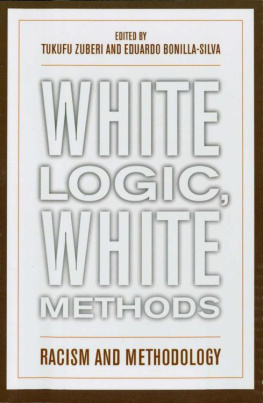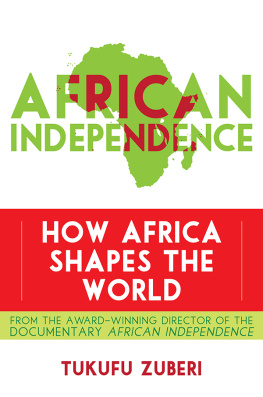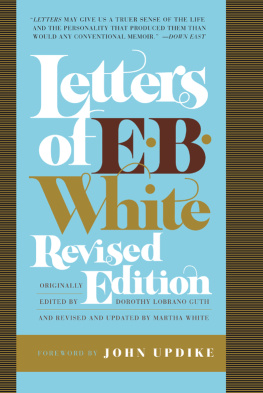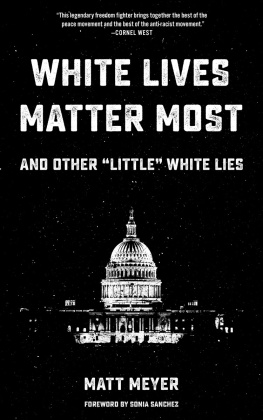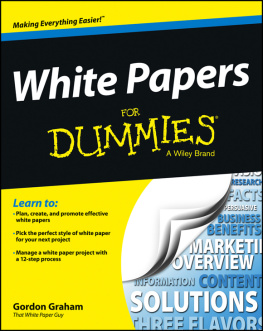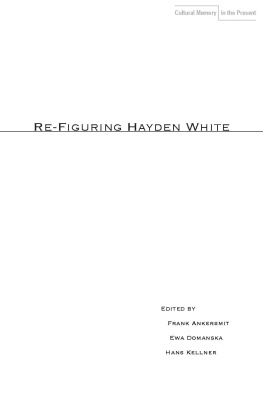Tukufu Zuberi - White Logic, White Methods
Here you can read online Tukufu Zuberi - White Logic, White Methods full text of the book (entire story) in english for free. Download pdf and epub, get meaning, cover and reviews about this ebook. year: 2008, publisher: Rowman & Littlefield Publishers, genre: Politics. Description of the work, (preface) as well as reviews are available. Best literature library LitArk.com created for fans of good reading and offers a wide selection of genres:
Romance novel
Science fiction
Adventure
Detective
Science
History
Home and family
Prose
Art
Politics
Computer
Non-fiction
Religion
Business
Children
Humor
Choose a favorite category and find really read worthwhile books. Enjoy immersion in the world of imagination, feel the emotions of the characters or learn something new for yourself, make an fascinating discovery.
- Book:White Logic, White Methods
- Author:
- Publisher:Rowman & Littlefield Publishers
- Genre:
- Year:2008
- Rating:5 / 5
- Favourites:Add to favourites
- Your mark:
- 100
- 1
- 2
- 3
- 4
- 5
White Logic, White Methods: summary, description and annotation
We offer to read an annotation, description, summary or preface (depends on what the author of the book "White Logic, White Methods" wrote himself). If you haven't found the necessary information about the book — write in the comments, we will try to find it.
White Logic, White Methods — read online for free the complete book (whole text) full work
Below is the text of the book, divided by pages. System saving the place of the last page read, allows you to conveniently read the book "White Logic, White Methods" online for free, without having to search again every time where you left off. Put a bookmark, and you can go to the page where you finished reading at any time.
Font size:
Interval:
Bookmark:

ROWMAN & LITTLEFIELD PUBLISHERS, INC.
Published in the United States of America
by Rowman & Littlefield Publishers, Inc.
A wholly owned subsidiary of The Rowman & Littlefield Publishing Group, Inc.
4501 Forbes Boulevard, Suite 200, Lanham, Maryland 20706
www.rowmanlittlefield.com
Estover Road
Plymouth PL6 7PY
United Kingdom
Copyright 2008 by Rowman & Littlefield Publishers, Inc.
All rights reserved. No part of this publication may be reproduced, stored in a retrieval system, or transmitted in any form or by any means, electronic, mechanical, photocopying, recording, or otherwise, without the prior permission of the publisher.
British Library Cataloguing in Publication Information Available
Library of Congress Cataloging-in-Publication Data
White logic, white methods : racism and methodology / edited by Tukufu Zuberi and Eduardo Bonilla-Silva.
p. cm.
9781461647010
1. Race relationsResearchMethodology. 2. Racism. 3. Prejudices. 4. United StatesRace relationsResearchStatistical methods. 5. African AmericansResearchStatistical methods. I. Zuberi, Tukufu. II. Bonilla-Silva, Eduardo, 1962
HT1521.W445 2008
305.8dc22
2007046456
Printed in the United States of America
 The paper used in this publication meets the minimum requirements of American National Standard for Information SciencesPermanence of Paper for Printed Library Materials, ANSI/NISO Z39.48-1992.
The paper used in this publication meets the minimum requirements of American National Standard for Information SciencesPermanence of Paper for Printed Library Materials, ANSI/NISO Z39.48-1992.
Eduardo Bonilla-Silva and Tukufu Zuberi
The best available methods of sociological research are at present so liable to inaccuracies that the careful student discloses the results of individual research with diffidence; he knows that they are liable to error from the seemingly ineradicable faults of the statistical method, to even greater error from the methods of general observation, and, above all, he must ever tremble lest some personal bias, some moral conviction or some unconscious trend of thought due to previous training, has to a degree distorted the picture in his view. Convictions on all great matters of human interest one must have to a greater or less degree, and they will enter to some extent into the most cold-blooded scientific research as a disturbing factor.
W. E. B. Du Bois, The Philadelphia Negro: A Social Study (1899)
In most respects, social science today is unrecognizably different from what it was in the years when W. E. B. Du Bois wrote his classic book The Philadelphia Negro. The social sciences have developed a whole series of methods of observation and analysis, and on the basis of these developments, have proceeded to describe the social world with a degree of confidence and consensus that only a few optimists could have expected in Du Boiss time. Many more social scientists are engaged in research, and the resources available for social research have also greatly increased from the thousands to the billions. The political conformity and development of convincing methods have led to the marriage of social research with social policy to an extent that was not possible in Du Boiss time, especially for a social scientist who was also an African American. The passage of years and positive turn of events have not, however, reduced the relevance of W. E. B. Du Boiss concerns with sociological methods.
Nevertheless, some readers will ask us, Why did you folks write a book on White logic and methods? They will likely be incensed and demand to know why we have titled our book White Logic, White Methods. The methodologically inclined will say, Methods are objective research tools beyond race, gender, and class. They will argue that social science methodology, like genetics, can be applied impartially regardless of the racial background of the individual conducting the investigation. Before we address these burning questions and points of view, we need to explain our motivations for editing a book such as this one. Thus, we begin this book in a very personal way with two vignettes from our own experiences in academia. We do so because we believe that our experiences showcase how White logic and White methods work in practice and how they blind (or severely limit) many social scientists from truly appreciating the significance of race (or, properly speaking, racial stratification). This book, accordingly, is not just the product of our sociological practice; it also grows out of our concerns with how the White racial logic influences the life chances of all racial subjects (Goldberg 1997, 1049) and the sociological imagination. This book is also personal in so far as we, like other sociologists of color, have felt the impact of racial stratification in our own flesh throughout our entire livesinside and outside of academia. Thus, we regard this as our first collaborative effort to attack White supremacy in contemporary research on race as well as in the methods most sociologists employ to examine, according to the logic that parades as objectivity, the so-called race effect. In this book, we will challenge the artificial distinction between analysis and analysts, individuals doing research and the world of scholarly knowledge, methods, and theory, a fiction of modern social analysis (Agger 2002).
In what follows, we do three things. First, we provide vignettes from our experiences in our respective sociological domains that show how White logic and White methods have affected us. Second, we conceptualize White logic and White methods and explain the problems they pose for sociology and its practitioners. Lastly, we conclude this introductory chapter with a brief description of each of the chapters in the book and explain what each brings to the methodological table.
In the first set of vignettes, Tukufu Zuberi discusses the reactions to his book Thicker Than Blood: How Racial Statistics Lie.
Since the publication of Thicker Than Blood in 2001, I have been invited by the major sociology and population departments in the country to discuss what I meant by writing such a book. In these discussions, there is always a question asked by some through scientific curiosity and by others through the difficulty of coming to terms with the history of racism among social scientists. Most scholars in attendance, nevertheless, think around these questions. They raise their hands in a half-hesitant sort of way, looking at me with a strange curiosity and then instead of saying directly Are you calling us racist? they ask, Are you suggesting social scientists practice racism when they use statistics? or Are you suggesting that the logic of statistical methods is racist? I answer restating the basic argument presented in the book.
Are you calling us racist?
I typically answer this first question by stating that in Thicker Than Blood I do not call anyone a racist. Rather than label individuals, or impute motive I provide an analysis of the history and logic of statistical analysis. I believe that social science is at its best when it is self-critical and relentlessly self-correcting. In order to be self-correcting we must be open to a critical evaluation of the methods we use and the conclusions that we have come to. In Thicker Than Blood I outline how statistical analysis was developed alongside a logic of racial reasoning. That the founder of statistical analysis also developed a theory of White supremacy is not an accident. The founders developed statistical analysis to explain the racial inferiority of colonial and second-class citizens in the new imperial era. I critically evaluate the history and practice of racial statistics to suggest ways in which social statisticians correct their practice.
Font size:
Interval:
Bookmark:
Similar books «White Logic, White Methods»
Look at similar books to White Logic, White Methods. We have selected literature similar in name and meaning in the hope of providing readers with more options to find new, interesting, not yet read works.
Discussion, reviews of the book White Logic, White Methods and just readers' own opinions. Leave your comments, write what you think about the work, its meaning or the main characters. Specify what exactly you liked and what you didn't like, and why you think so.

